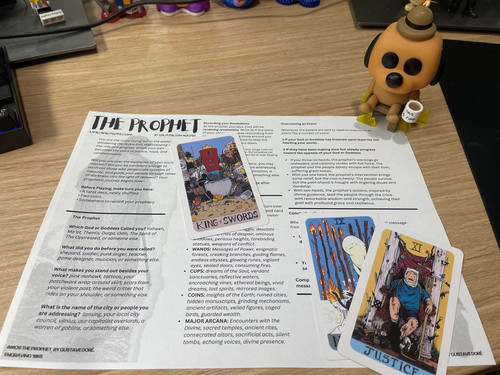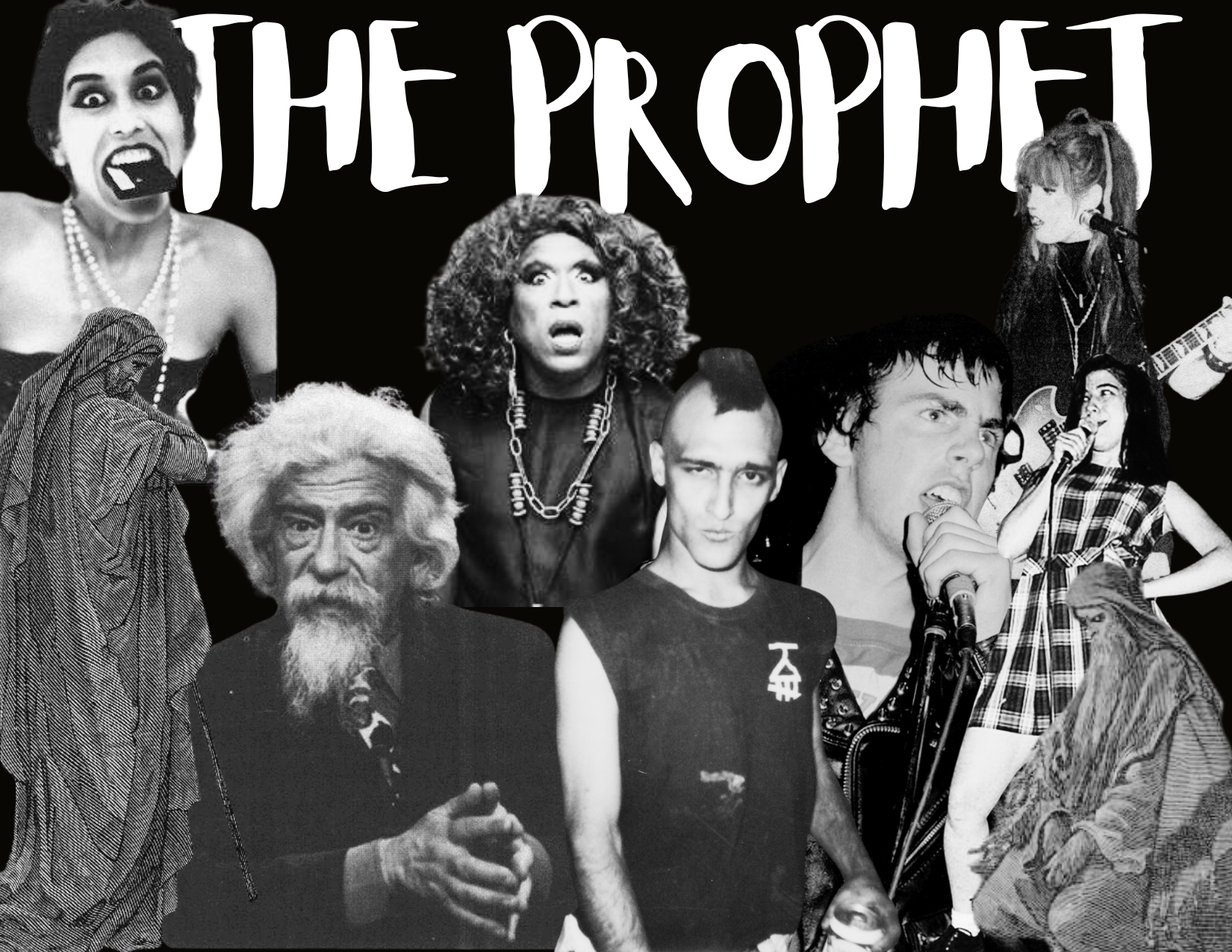Introducing The Prophet and an Introduction to Solo-Journaling RPGs

Good Afternoon Everyone,
Today is the day I published my very first game titled The Prophet.
The Prophet is a solo-journaling role-playing game. It requires a tarot deck and can be played in as little as 30 minutes or over days.
Receiving Revelations: Turn over a tarot card and let the prompts and the card image be the revelation from the deity that called you. Navigating through visions of struggle and cries of despair, following the guiding flames of insight, to help turn your people’s trajectory towards justice and equity.
Overcome Events: Flip coins to find out if the people heed your warnings and are aided by their deity in overcoming enemy invasion, surviving a great earthquake, or a raging fire, or are crushed by the weight of divine condemnation reaping upon themselves the consequences of sewing the seeds of inequity.
Concluding the Revelation: Will there be any hope for redemption for those receiving your words or will they be deemed beyond saving?
Record your Revelation: Write with the prophetic vigor of your favorite punk singer or a more traditional prophet. Write as if the voice of your chosen deity was resounding from your being, addressing those around you who would like to continue to reap the benefits of keeping others down.
Let me be perfectly queer, this game was inspired by Abraham Joshua Heschel, Amos, Isaiah, Kathleen Hanna, Greg Graffin, Vaginal Davis, Deke Nihilson, GB Jones, Alice Bag, and all the other Punk and not-so Punk prophets who inspire me to continue to live a more embodied life.
This is a Princess Sword game, based on Anna Anthropy’s Princess with a Cursed Sword, available at w.itch.io.
Anna's work in the solo-journaling RPG field is unparalleled. I strongly recommend that you check out not only her games based on the SRD found here but the rest of her work as well.
Supporting my work helps me to fund future Queercore art initiatives that I am working on within my community.
The Solo-Journaling Primer:
I know some of you might be new to solo-journaling games, and I wanted to give you an introduction to what you might be getting into and why I love them so much.
Playing a solo-journaling RPG is a deeply personal and immersive experience that blends the imaginative storytelling of role-playing games with the introspective nature of journaling. As the sole player, you step into a narrative world, guided by prompts and rules that help shape your journey. Here's what it's like:
Immersive Storytelling
You become the protagonist of your own story, navigating through a series of scenarios and challenges. Unlike traditional RPGs, there’s no Game Master or other players; you rely on your imagination and creativity to build the world and its characters. The prompts provided by the game serve as a catalyst, sparking your creativity and guiding the narrative.
Personal Reflection
Journaling elements encourage deep reflection. You write about your character’s thoughts, feelings, and actions, allowing you to explore their motivations and growth over time. This process can be therapeutic, as it often mirrors your own experiences and emotions, providing a space for self-discovery and personal insight.
Flexibility and Freedom
Solo-journaling RPGs offer immense flexibility. You can play at your own pace, whenever you have time, and pause and resume as needed. There’s no pressure to keep up with a group or adhere to a strict schedule, making it an ideal format for those with busy lives or unpredictable availability.
Creative Expression
These games are a canvas for your creativity. You can experiment with different writing styles, develop complex characters, and weave intricate plots. The game’s structure provides a framework, but the story is entirely yours to create and control.
Emotional Engagement
Engaging deeply with the narrative and your character’s journey can evoke a wide range of emotions. As you confront challenges, make decisions, and reflect on outcomes, you may find yourself experiencing joy, sorrow, excitement, and tension, making the experience rich and rewarding.
Mindfulness and Focus
The act of writing by hand or typing out your journal entries requires focus and mindfulness. It’s an opportunity to disconnect from the digital world and immerse yourself in a meditative activity that promotes mental clarity and relaxation.
Personal Growth
Over time, playing a solo-journaling RPG can lead to personal growth. By regularly reflecting on your character’s journey and the decisions they make, you may gain new perspectives on your own life, develop problem-solving skills, and enhance your ability to articulate thoughts and emotions.
Solo-journaling RPGs offer a unique and enriching experience that combines the best aspects of role-playing and journaling. It offers a space for creative expression, personal reflection, and emotional engagement, all within the flexible and forgiving framework of solo play.
Some of you might be wondering how to end a Solo-Journaling session or a longer solo campaign:
In a solo-journaling RPG, the ending is as personal and flexible as the journey itself. Unlike traditional RPGs with predefined endings or campaigns with set conclusions, the end of a solo-journaling RPG is entirely in your hands. Here’s how it works:
Self-Determined Closure
You have the ultimate control over when and how your story concludes. There’s no need to wait for others or follow an external timeline. You can decide to wrap up the narrative when you feel your character’s journey has reached a natural conclusion, whether that’s after resolving a central conflict, achieving a significant goal, or experiencing profound personal growth.
Organic Development
The game ends when you feel the story has been fully told. This could be after a few sessions or many months of detailed journaling. The organic nature of the narrative allows you to explore various arcs and subplots until you find a satisfying end point. This flexibility ensures the ending feels earned and complete, resonating with the journey you've crafted.
Emotional Satisfaction
You have the freedom to end the game when you feel emotionally satisfied with the story. If you reach a moment that feels like a perfect conclusion—perhaps a poignant revelation, a climactic event, or a peaceful resolution—you can choose to stop there, ensuring the ending feels fulfilling and true to the character’s development.
Reflective Pause
Ending a solo-journaling RPG can also be a reflective pause. You might decide to bring the story to a close after a significant milestone, allowing you to reflect on the journey and the growth of your character. This pause can be a moment to appreciate the narrative and the insights gained before potentially starting a new adventure.
Flexibility to Return
Even after concluding the story, the flexibility of solo-journaling RPGs allows for future revisits. If you later feel inspired to continue the journey or explore new aspects of the character’s life, you can pick up where you left off or start a new chapter, providing endless possibilities for ongoing storytelling.
Personal Satisfaction
Ultimately, the end comes when you feel personally satisfied with the story. The freedom to end the game on your terms ensures that the conclusion aligns with your creative vision and emotional connection to the narrative.
In essence, solo-journaling RPGs end when you decide they do, offering a deeply personalized and satisfying experience. This control over the narrative's conclusion ensures that the story remains meaningful and complete, reflecting your unique journey through the game.
Get The Prophet
The Prophet
You are the prophetic voice crying out in the wilderness.
| Status | Released |
| Category | Physical game |
| Author | John-Marx |
| Tags | journaling, prophet, punk, solo, Solo RPG, Tarot |

Leave a comment
Log in with itch.io to leave a comment.